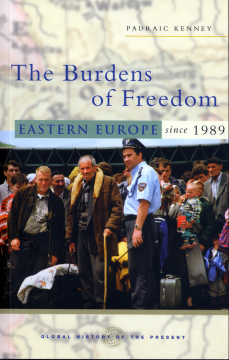
Additional Information
Book Details
Abstract
From Estonia to Macedonia, this book is a history of 15 countries as they negotiate their transition from communism. For some, the story ends happily, with triumphant entry into the European Union in 2004.Others are caught in limbo, destroyed by nationalist politics, war and genocide, or crippled by corrupt political practices.
The Burdens of Freedom considers the effects of revolutionary change, the resurgence of nationalism and the painful examination of the past. It looks at the process of building stable democratic states, and their integration with international structures. Most of the countries have established admission to the EU as a national objective; but many of them have also been active participants in the American-led occupation of Iraq. Domestically, each has seen a divide emerge between winners and losers. All are moving forward simultaneously to democracy, unity and prosperity, but also to national division and economic disparity.
Padraic Kenney divides his time between Wroclaw, Poland and the University of Colorado at Boulder, where he is professor of history. He is the author of several books on Eastern European history and politics, including A Carnival of Revolution: Central Europe, 1989 (2002).
‘An exceedingly useful book a sensible and perspicacious assessment of the complex and often just plain confusing developments after 1989.’
Michael Geyer, University of Chicago
'The Burdens of Freedom makes sense of the paradoxical development of a vast and diverse region: its arduous economic transitions, its accommodation of painful pasts, and despite intervening disillusion and setbacks, its emerging civic stamina.'
Charles S. Maier, Harvard University
Table of Contents
| Section Title | Page | Action | Price |
|---|---|---|---|
| Cover\r | Cover | ||
| Contents | v | ||
| Acknowledgments | vi | ||
| Map: Eastern Europe in 1989 | viii | ||
| Map: Eastern Europe in 2006 | ix | ||
| Introduction: the shock of the new | 1 | ||
| 1 | Different paths on an open road: economic and social change | 15 | ||
| A time for experiments? | 16 | ||
| More shocks to the system | 26 | ||
| Movements after revolution | 32 | ||
| To market | 39 | ||
| 2 | In praise of ethnic cleansing? National struggles | 45 | ||
| Nationalist extremes | 47 | ||
| Minorities, majorities, citizens | 51 | ||
| Shakespeare in Yugoslavia | 56 | ||
| Alternatives to cleansing | 68 | ||
| 3 | Peeling away the past: nostalgia and punishment | 75 | ||
| Layer one: post-communist crimes | 76 | ||
| Layer two: uncertain births | 79 | ||
| Layer three: the communist mirror | 82 | ||
| Layer four: Stalin’s shadow | 89 | ||
| Layer five: dark passage | 92 | ||
| Making it right | 94 | ||
| The case for nostalgia | 98 | ||
| 4 | Portraits of hubris: democratic politics | 100 | ||
| Change before democracy | 101 | ||
| The rise and fall of heroes | 105 | ||
| Return of the communists | 109 | ||
| Four last dictators | 114 | ||
| 5 | A new Europe: the East in the West | 128 | ||
| An “anachronistic straitjacket” | 129 | ||
| New neighbors | 133 | ||
| NATO expands | 135 | ||
| The mysteries of Yugoslavia | 137 | ||
| Nation-building in NATO and the EU | 144 | ||
| Whose Europe? | 153 | ||
| Conclusion: the edge of history | 159 | ||
| Notes | 163 | ||
| Introduction | 163 | ||
| 1 Different paths on an open road: economic and social change | 163 | ||
| 2 In praise of ethnic cleansing? National struggles | 165 | ||
| 3 Peeling away the past: nostalgia and punishment | 166 | ||
| 4 Portraits of hubris: democratic politics | 168 | ||
| 5 A new Europe: the East in the West | 169 | ||
| Index | 171 |
